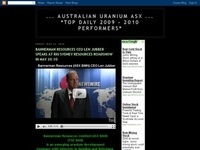Published on Wednesday June 08 2011 (AEST)


AUSTRALIA should try to get its first electricity generating nuclear reactor up by 2022, despite the Fukushima nuclear plant accident in Japan, the head of the Australian Uranium Association says.
But with political debate reaching its ``crescendo'' Mr Angwin said attention could now be given to Australia's future energy sources, including nuclear.
He said although the meltdown of reactor cores at the Fukushima nuclear power plant in March caused nuclear energy to fall out of favour, the various international examinations would address many safety issues and give the community greater assurances over the power source.
``Now is not the time for policy makers to go any softer on nuclear power,'' Mr Angwin said.
He called for a ``genuine conversation in which the outcome is not pre-determined by political fear and which there's some considered, weighing up of benefits of cost and after which the country makes a genuine choice.''
Mr Angwin called on the Productivity Commission to bring Dr Ziggy Switkowski's 2006 report into nuclear energy up-to-date in light of the Fukushima accident and the current climate change policy debate.
A nuclear energy commission should be established to provide the regulatory framework and identify possible reactor sites, while the government should encourage nuclear business proposals from industry.
If that path was followed, Australia could have its first power-generating nuclear reactor by 2022, he said.
Fukushima was not the accident which resolved the nuclear debate in favour of the anti-nuclear side but re-opened the entire debate.
The current debate among global greens groups was no longer about their anti-nuclear tactics but whether nuclear energy was better than fossil fuels.
Mr Angwin criticised those who argued against nuclear power because solar power was a baseload power source, '' in that they think solar is a consistent and reliable, around-the-clock source of energy''.
``Bear in mind most people's only experience of solar power is likely to have been installing photovoltaic panels in their roof at the expense of other tax payers.''
 Australian Uranium News - Research
Australian Uranium News - Research


Overhaul over India's Civil Nuclear Developments
ReplyDeletehttp://parallelnations.blogspot.com/2011/04/indias-civil-nuke-developments-must.html
Overhaul over India's Civil Nuclear Developments
ReplyDeletehttp://www.parallelnations.blogspot.com/2011/04/indias-civil-nuke-developments-must.html
Very creattive post
ReplyDelete